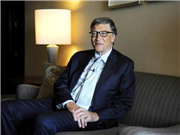
Bill Gates
Founder, Microsoft
Microsoft
Microsoft-founder Bill Gates, 58, is the world's richest man with a fortune of $76 billion.
Having stepped down as chairman and then turning to a "technology adviser" for Microsoft's new CEO Satya Nadella, he now spends his time trying to save people from preventable death. It's not easy, but the impatient optimist and co-chair of the Bill and Melinda Gates Foundation has a plan. Funding the fight against polio was a small part of it.
Gates speaks to health editor Sanchita Sharma about the things that excite him, things that annoy him, and the optimism that keeps him going.
1. What keeps bringing you back to India?
A. Over 20% of the world's children are born here, and over 40% of them don't get a full set of vaccines. About 40% grow up without full physical and mental development. The opportunity to understand what tools could be invented and what systems could be used to improve these things excites us.
2. The world is close to having a computer in every home. Are we moving fast enough in getting a toilet in every home too?
A. Actually, making toilets either at the community or household-level and having them affordable and attractive - which in the case of toilets implies that they don't smell badly - that's a tough challenge.If you were to go to every city in India and get piped clean water for every toilet in every home and a pipeline that treat the water, you're talking about literally hundreds of billions of dollars.
And yet, we should be able to create a toilet design that doesn't require all that, something that chemically treats the waste in such a way that the smell and the disease-causing properties are eliminated, and that too economically. In fact, some of the designs generate extra energy, and even act as chemicals for fertilisation that is completely clean. So, there is a lot of excitement around innovation in that space.
3. You're meeting Prime Minister Narendra Modi on Friday. Will you discuss toilets and sanitation with him?
A.The PM has enunciated some fantastic goals in sanitation and financial services. He held a discussion about adding new vaccines very quickly. So really, sitting down and saying, we want to help with goals that you have already enunciated, and be a good partner for delivering those things across all of India - I think that will be a key topic of conversation.
4. How can technology scale up low-cost innovations to reach those who need it the most?
A. The poor are lacking vaccine coverage, and we can certainly use the tools to make sure that the workers are coming in, the supply chain is working, and if they are serving everybody who comes to these clinics. Technology can also be used to watch how the money is moving, to see where it is going, and where the money should go. Digital tools make it easy to keep track of what's getting done.
5. Do you think India is looking after its mothers and children?
A. India has made a lot of progress in the last decade, and so a lot less children and mothers are dying now. But there is still a substantial gap left. Things like stunting - India is not really doing as well for its children as it should. And when you allow these children to be stunted, you're also holding back their mental development. What is India's primary resource? Why is everybody, including us, so excited about the future of India? It's because of its people... Between fixing health and fixing education, that's where India can really achieve these really high growth rates, and find itself in a very different situation 10-15 years from now.
6. Your foundation donated $50 million to fight against Ebola. How would the money be used?
A. We're spending about $20 million on tools, which are drugs, vaccines and diagnostics. We've given $15 million to global partners and $15 million to local partners. I'm getting many emails every day asking whether things are going well, whether they're not going well. We and others would give even more if we see that it is needed.
7. Do you discuss diarrhoea and toilets with your kids over dinner?
A. We kinda joke about it. 'Do you guys want to hear about our Foundation work?' Another joke is about, "Hey, your father is going to visit sex workers in India." And how many family conversations are about, 'what did you see when you visited the red-light district, father? What stories did you hear?'
8. How far is the world from polio eradication?
A. I've spent a lot of time on the issue. Until Ebola came along, I received more emails on that than any global health thing. We're hopeful that within the next year, we'll see the last case in Nigeria. The quality of their campaign keeps improving and it feels a lot like the time when India got close. Pakistan is the other place... There's some progress in terms of getting into Waziristan. They are hopeful, but if we have to guess right now, it's not quite clear. Pakistan right now would possibly be the last place (for polio).
9. What are the two qualities that drive success?
A. I think you have to learn a lot of things and look at a lot of cases where things went well and didn't go well. We have to be pretty analytical about it and ask what happened there. We need to ask ourselves what the opportunity is to change things.
10. What do you do to unwind?
A. I play tennis, I have three kids. Melinda and I just took our 18-year-old daughter to university on Tuesday. After we said goodbye to her, we flew to India. We do a lot with our children, we have a 12-year-old and a 15-year-old too.
Source: Hindustan Times
|